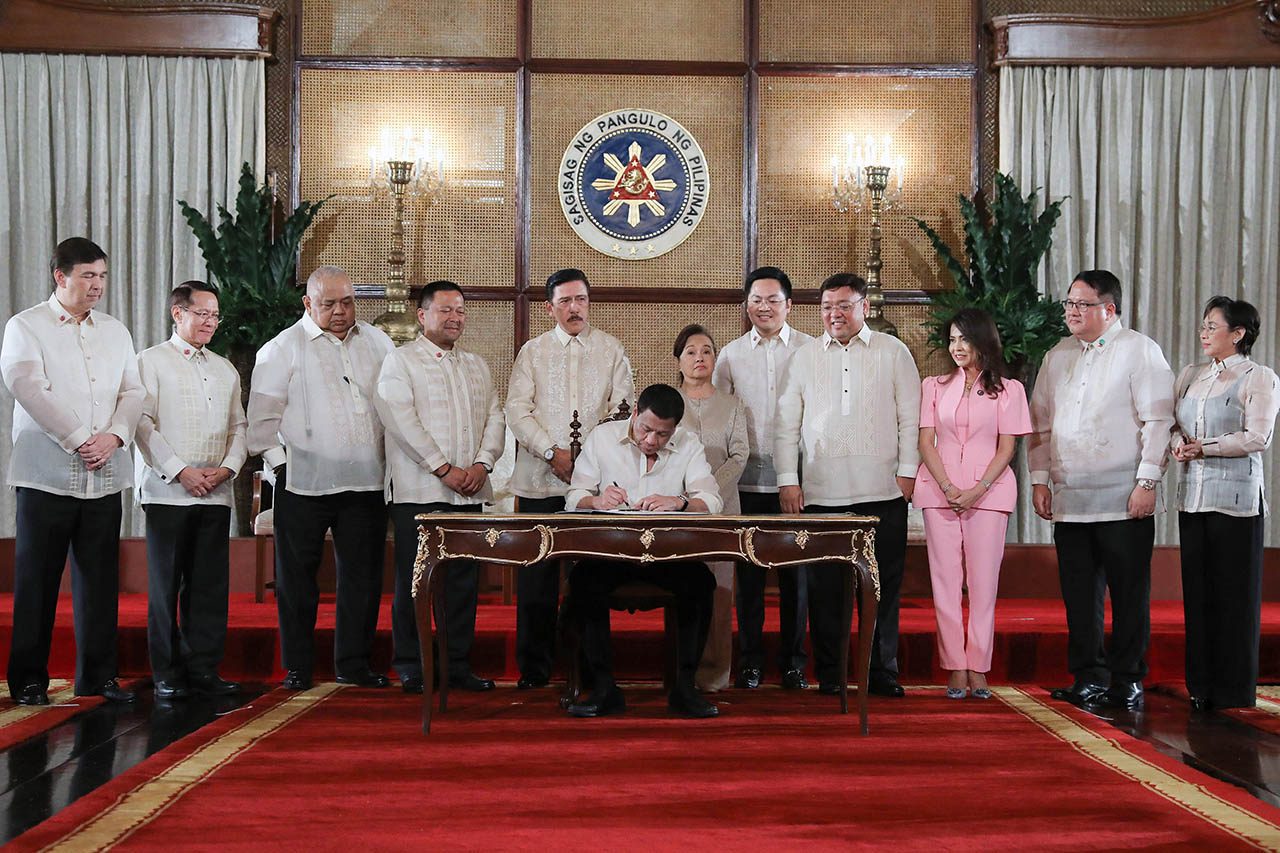SUMMARY
This is AI generated summarization, which may have errors. For context, always refer to the full article.

MANILA, Philippines – Senator Panfilo Lacson, among the veterans in the chamber, posted a tweet on Tuesday, February 19, crediting reelectionist Senator Joseph Victor Ejercito for the universal health care (UHC) law that President Rodrigo Duterte was set to sign.
“Sen JV is one of the most hard-working senators I’ve seen in all my 18 years in the Senate. We might as well refer to the Universal Health Care Act as the JV Ejercito Law,” Lacson said on Twiiter.
Duterte signed Republic Act 11223, which grants health coverage for all Filipinos, on Wednesday, February 20.
Ejercito, however, is not the only one who should be credited for this landmark legislation that passed in the 17th Congress.
Owing to the bicameral nature of Congress, legislation is a combination of lawmakers’ efforts at the House and the Senate, with the principal author and principal sponsor primarily steering the measure.
There were also other government agencies, like the Department of Health, that helped formulate the bill.
Senate
Ejercito is the chairperson of the Senate health committee. As panel chair, he was tasked to sponsor and defend the bill in plenary.
There were others who filed UHC bills, however. They were Senate President Pro-Tempore Ralph Recto and senators Leila de Lima, Juan Edgardo Angara, Nancy Binay, Cynthia Villar, and Risa Hontiveros.
Of the 7, it was Recto who had pushed for the UHC bill since the 15th Congress.
It was also Recto who first filed the measure in the 17th Congress. Under Senate rules, the first one to file the measure would be named principal author.
Recto also pushed for amendments, which were eventually adopted into the final version of the law. These include the provisions on:
- Corresponding increase in benefits for every increase in contribution
- Reconstitution of the PhilHealth Board
- Lesser compliance for the private sector in developing and maintaining a Health Information System
Ejercito was the principal sponsor and among the co-authors of the bill.
Other co-authors were Senate President Vicente Sotto III, Majority Leader Juan Miguel Zubiri, and Minority Leader Franklin Drilon; and senators Binay, De Lima, Villar, Angara, Hontiveros, Joel Villanueva, Sherwin Gatchalian, and Manny Pacquiao.
Ejercito sponsored the committee report on July 31, 2018. After less than 3 months, Senate Bill 1896, which was certified as urgent by President Rodrigo Duterte, was unanimously approved on third and final reading.
House of Representatives
At the House, there were over 100 authors of the measure. The bill was sponsored and defended by Quezon 4th District Representative Angelina Tan and then-Kabayan representative Harry Roque, who was later appointed as Duterte’s spokesperson.
The House was first to approve the measure. On September 6, 2017, 222 lawmakers voted in favor of House Bill 5784, while 7 from the Makabayan bloc voted against it.
After both chambers passed the measure, a bicameral conference committee was convened to thresh out differences between the two versions.
The Senate sent Ejercito, Recto, Gatchalian, Villanueva, and Hontiveros as its contingent.
The House assigned Tan, Kabayan Representative Ron Salo, Sorsogon 1st District Representative Evelina Escudero, Nueva Ecija 1st District Representative Estrellita Suansing, Zambales 2nd District Representative Cheryl Deloso Montalla, Bataan 2nd District Representative Jose Enrique Garcia III, and Laguna 1st District Representative Arlene Arcillas as its conferees to the bicam.
It was not easy finalizing the bill, with two pre-bicam sessions held before conducting two bicam proper.
On November 27, 2018, the panel approved the final version of the bill.
Nearly two months after, on January 23, 2019, enrolled copies of SB 1896 and HB 5784 were sent to the Office of the President for signing.
Almost a month later, before the bill lapsed into law, Duterte signed the measure.
The government will now have to craft the implementing rules and regulations. The law will take effect 15 days after it is published in the Official Gazette or a newspaper of general circulation. – Rappler.com
Add a comment
How does this make you feel?
There are no comments yet. Add your comment to start the conversation.